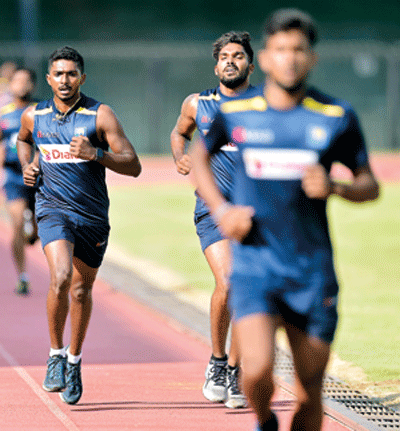SLC turns ‘harshly’ soft on fitness policy and benchmarks

Under the new policy players won't be dropped, instead their payments will
A recent skinfold test found three key players of the national white-ball set up reporting levels exceeding the benchmark of 85mm, but a policy change helped the trio earn their place in the T20 team named for the ongoing Australian series.
Players Bhanuka Rajapaksa, Wanindu Hasaranga and Danushka Gunathilaka have all reported skinfold levels well above the set standards with Rajapaksa reporting a shocking 106.2mm. Gunathilaka has recorded a value of 97.8mm while Hasaranga has a value of 93.6mm.
However, a failed fitness test no longer makes players ineligible for selection as Sri Lanka Cricket (SLC) has now introduced a financial penalty mechanism to deal with those taking fitness lightly. This allowed Rajapaksa to return to the national fold having missed Sri Lanka’s last two assignments against Australia and India for lagging fitness standards. Rajapaksa’s omission in those series saw a public outcry after the left-hander was selected to play in the cash-rich Indian Premier League. Rajapaksa’s weight and fitness are longstanding concerns, even though his performance as a middle-order batter has been fairly good in the shortest format. A powerful hitter of the ball, the left hander had a decent run at the IPL.
But his return to the national team has so far been unproductive, scoring 0 and 13 in the first two T20 games against Australia. Gunathilaka, too, has had fitness issues earlier but Hasaranga has maintained an unblemished record until recently.
Both Rajapaksa and Hasaranga, and four others were allowed to compete at the recent Indian Premier League (IPL) with specific instructions to follow fitness programmes provided by the local trainers to the trainers at respective franchises. “One condition we (selectors) laid down was to have assessed their fitness levels periodically. We asked the local trainers to provide these players with tailormade programs for each individuals to be followed during the IPL. They were to be monitored by the trainers at IPL teams and report to us. I don’t think this has happened,” explained Chief Selector Pramodya Wickremasinghe, when asked whether there was a monitoring mechanism in place to check player fitness when they were away from national duty.
“If it had been the case in the past, the local trainers would have noticed the increased skinfold levels of these two players and attended immediately. But this has not happened and we only got to know this after the team was selected for the Australia tour.”
SLC’s trainers have only conducted a skinfold test and no time trial has been done to see whether they are in with required fitness level to play international cricket.
“We took this challenge of setting fitness standards a year ago and it had an impact on performance. However we also attracted lots of criticism forgoing hard at the players. But we did it with good intention. However we do not handle this anymore as it has now been transferred to the coaching department. So it’s their responsibility to make sure the players achieve required fitness levels which are non-negotiable,” he added.
Under the new system, 20 percent will be deducted on pro-rata system from their contracts—which means the trio will receive a substantial pay cut, while the second, third and fourth offences will see 40, 60 and 80 percent pay cuts. Fitness benchmarks which have been incorporated into player contracts allow SLC to terminate an agreement if a player fails three consecutive fitness tests conducted on a quarterly basis.
The Board made fitness tests mandatory for selection on the recommendation of the Selection Committee headed by Pramodya Wickremasinghe in a bid to improve the overall fitness levels of Sri Lanka cricketers.
Though the test remains mandatory, benchmarks have also been eased with the new minimum standards being set at 85mm for skin-fold and 8 minute and 55 seconds for 2km time trial. The previous levels for skin-fold were set at 70mm and 8 minute and 10 seconds for the 2km time trial respectively.
“These heavy penalties will deter them from taking fitness lightly,” said SLC CEO Ashley de Silva.
“When certain players were dropped on fitness ground, the selectors were put under tremendous pressure by various quarters. This is why we’ve introduced heavy penalties.”


